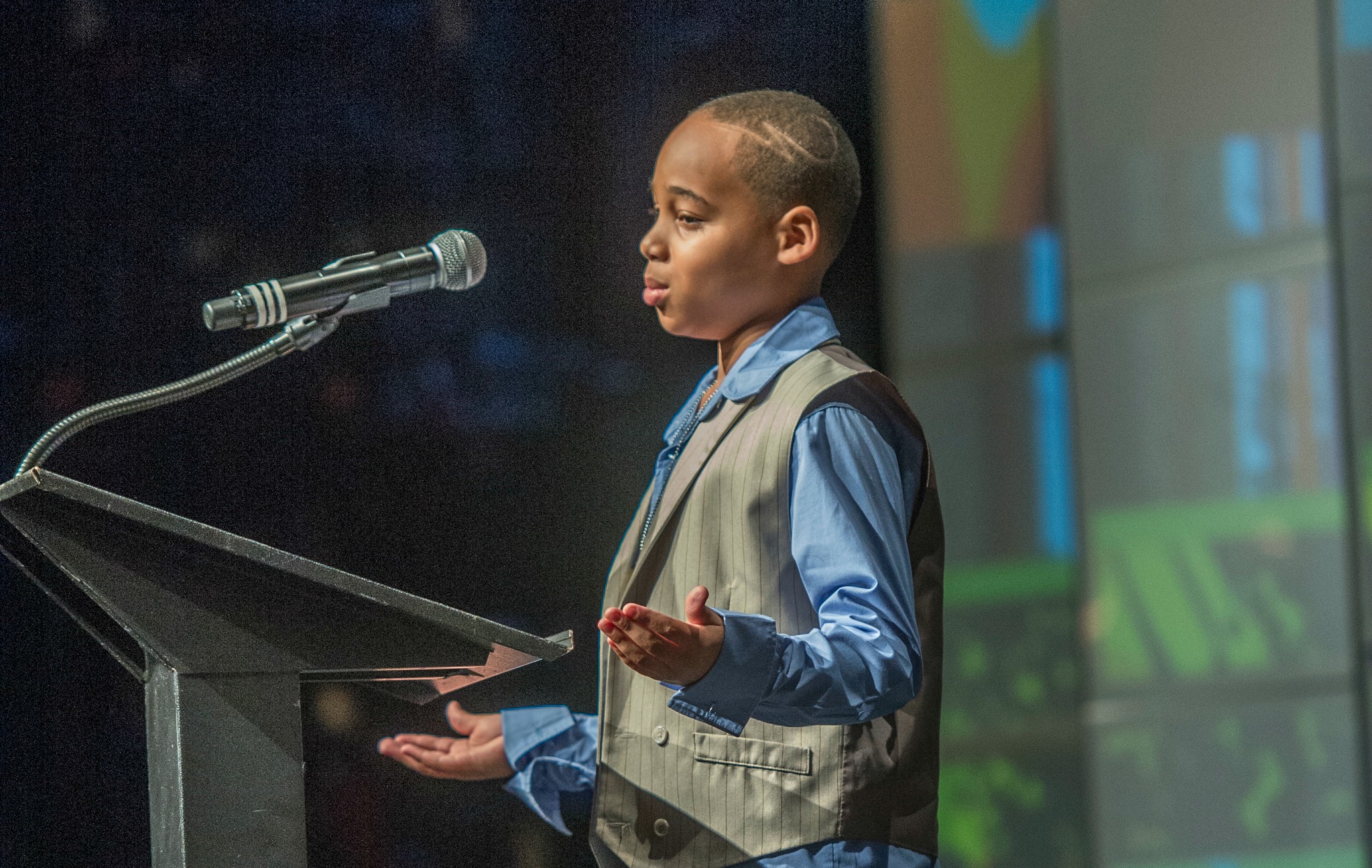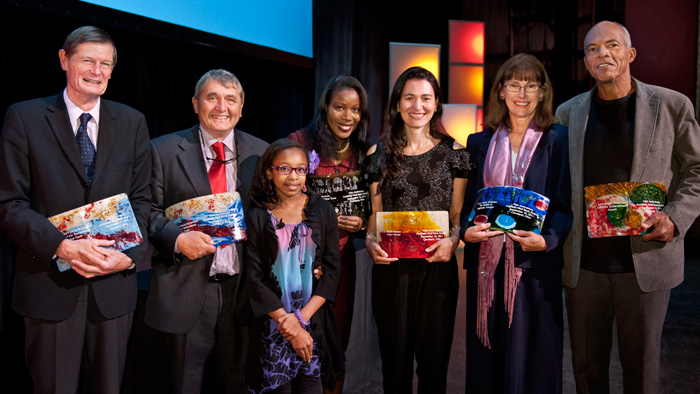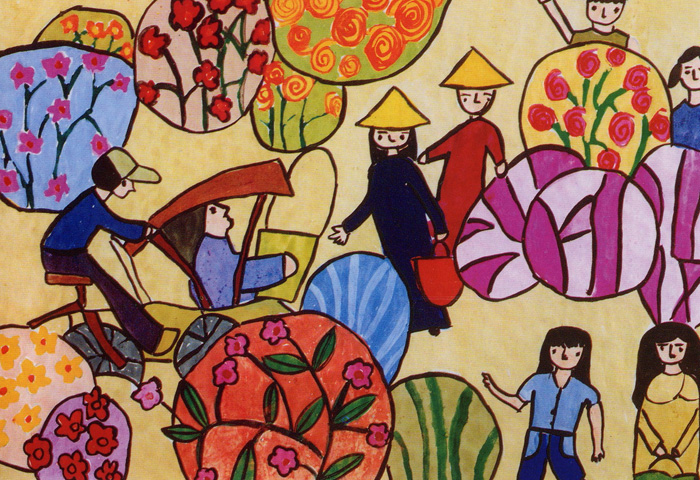by Ali McClain
The beginning movements of this essay began with a complex question: Which author’s reading from the 80th Annual Anisfield-Wolf Book Awards would I choose to reflect upon? I describe the question as complex because while each award recipient—Jericho Brown, Marilyn Chin, Marlon James and Richard S. Dunn—gave memorable readings, I found myself wanting to reflect on the writer (a non-recipient of the award) whose work struck me the most with feelings of anger, bleakness and dignity. I chose Joesiah Poulson, who commenced the readings with his unforgettable poem, “Am I Invisible?” He wrote this while still in fourth grade, using it to explore, document and investigate struggle and self-doubt. I had to choose Joesiah.
Ronn Richards, CEO of the Cleveland Foundation, introduced Joesiah with the expected credits: the poet’s full name, school, grade level and title of poem. Audience members learned that Josiah’s presence at the 80th annual award ceremony was the result of a partnership with Kent State University’s Wick Poetry Center. When Richards announced Joesiah’s title “Am I Invisible?” an unsettling small ripple of laughter flowed throughout the audience.
It was a disturbing beginning. Had the audience just laughed at Joesiah’s title, finding it funny? Did they laugh as a way to say, “Yes, Joesiah, you are invisible and it is comical that you’ve asked such a question?” Perhaps the audience’s laughter was the result of discomfort in knowing a young poet, a child, is in tune with the disturbing themes Ralph Ellison explored in his novel Invisible Man — racism, limitation, stereotypes and self identity.
But, as usual, in moments of awkwardness and discomfort, the poet rises. Joesiah begins his reading and the speaker of the poem opens with testimony:
I’ve been down long roads,
said yes when I meant no.
I lost control of the wheel.
This is not the kind of testimony I expect a boy of 11 to write about. Joesiah is prematurely expressing his awareness of hard times, insecurity and powerlessness. Joesiah‘s decision to begin the poem with a first person speaker creates an urgent transparent mood and emphasizes the personal testimony theme of the poem. Joesiah continues with a structure complete with questions and statements. The second stanza questions an unknown second person. The second stanza asks:
Do you ever wonder
when you listen to the thunder,
why your world feels so small?
The narrator quickly shifts the attention to the second person. This shift forces readers and audience members to ask themselves a question. It is as if the narrator is asking readers to consider the ideas of feeling insignificant and unimpressive. And, perhaps the narrator is asking readers to consider the feelings of the unknown “I” from the preceding opening stanza, as in — put yourself in my shoes. Joesiah is ultimately asking readers to empathize.
Joesiah’s poem is short and made of six stanzas (each stanza is a tercet). Joesiah decides to make his narrator continually ask questions throughout the poem. Four questions are posed throughout the poem (and let’s not forget that Joesiah even titles his poem as a question — “Am I Invisible?”). The third stanza is solely made of questions. Joesiah writes:
Do you ever think
what you’re standing at the brink of?
feel like giving up, but can’t walk away?
The author creates a timely poem filled with one of our most important tasks: Delivering testimony and asking questions in order to create conversations around some of our most sensitive and challenging topics: race, identity, racism and hardship. In the most haunting line (line 12) of the poem the narrator introduces the notorious “they” pronoun:
Put yourself on the line,
though you feel inside
like they don’t know you’re alive.
Joesiah’s voice offered an unsettling timbre during this part of his reading at Anisfield. His innocent and naturally child-like voice carried throughout the auditorium with an uncomfortable spirit of sadness and hopelessness. It seems that one of Joesiah’s aims in writing “Am I Invisible?” was to announce his alertness of how distant we are from reaching the very goal and dream of the Anisfield-Wolf Book Awards. There is very little to show as evidence that we are, as Joesiah writes, at “the brink of” change or close to solutions for diminishing racism and embracing human diversity. Joesiah is clearly aware that “they” are mercilessness and cruel.
Then there is a shift in the reading and in the poem. By the fifth stanza of the poem there is a sense that something must change. The solitary speaker turns the question on the self. Joesiah writes:
Night after night trying to decide,
am I going to speak out
or get lost in the crowd?
A decision has to be made. In the final stanza of the poem Joesiah decides:
When the lights go down in the city
I’ll be right here
shining.
Joesiah brings hope and determination even as he closes the poem with dark imagery, “Night after night” (line 13) and “When the lights go down” (line 16). We are to believe that despite going through “long roads” and getting “lost in the crowd” — we must stay strong. Joesiah ended his reading with a sudden and unpredictably confident and determined voice. His message was clear: we must continue to shine even in hard times. A woman sitting next to me responded to Joesiah’s reading with an erupting “Amen!” and the entire auditorium exploded with applause, cheers and whistles.
Joesiah‘s skill to take readers (and audience members) through a wide range of emotions: despair, hopelessness, angst and then back to hope is impressive. A novice writer, Joesiah shows admirable control over the elements of diction, structure and rhyme. The fifth grade poet has earned the ahead-of-his-time marker. His poem forces us to get honest about the effects of racism and the damage that comes with denouncing human diversity. Joesiah answers his own questions and ultimately takes matters into his own hands. He shows us how critical it is to rely on the self for answers, validation, and strength.
Ali McClain is a Cleveland poet and graduate student. She directs an after-school program for girls ages 10-18 at West Side Community House. She is also a co-founder of acerbic, an artist collective.




Renee Aten
January 20, 2016
Ali’s essay gave me a much clearer and deeper understanding of how the poem was structured to illicit such a strong response. Thank you, Ali, for introducing me to Josiah. His poem resonates with me as I am sure it does with many others. As a child, Josiah beautifully expressed what it is to feel invisible. He lifts us all up when he tells us he’ll be right here shining. If he can write like this as a child, I await his future works with great anticipation. Thank you Josiah for shining on us all!